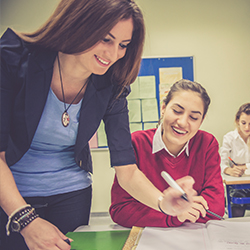Year 10 and Year 11
 Age: Usually between 14 – 16 years old
Age: Usually between 14 – 16 years old
Stage of learning journey: Key stage 4.
Curriculum: National Curriculum
Milestones
Your child's school must provide careers advice from Year 8 to Year 13. Find out more about careers advice in schools.
GCSEs Examinations
GCSE’s are the main qualifications that your child will take in Key Stage 4. They are designed to be studied over two years in Years 10 and 11. Some schools encourage students to study certain GCSE’s in one year, taking the exams at the end of Year 10.
Your child will take GCSEs in between 8-11 subjects, depending on the recommendation of their school, their academic ability and topics they are interested in.
Find out more about GCSE’s
Work Experience
Your child may be given the opportunity to do some work experience during Year 10 or Year 11 through their school. (Not all schools offer this opportunity as work experience is now included in post-16 learning). The work experience should be related to a job or career that your child is interested in. Find out more about work experience.
How you can help
As your child starts to study for GCSEs and other qualifications you may find they have to do a lot more work. Your support, encouragement and interest can make a huge difference to your child’s motivation and ability to cope with the demands at this time. But teenagers need support on their own terms try to -
- Be open to their ideas about how they want you to help them
- Look for opportunities to open up discussions on issues or subjects
- Ask your teenager what they are studying and what they find hard – try to work out together how you can help
- Talk to your teenager about information their school or college may have provided
- You can talk to staff directly but make sure you think about how your teenager will feel about this
- Talk about the books you're both reading.
- Ask what books your child would like for birthday and Christmas presents.
- Encourage your child to read or watch the news online and find news stories that connect to lesson topics.
- If you’re planning a day out, visit a museum or gallery that will tie in with work your child is doing in subjects such as Art, English, History, Geography or Science - this can be a fun way to add depth and interest to your child's learning.
- Download 'Coaching your teenager' (PDF, 2905K) a booklet to help parents get involved with their teenager's learning
Helping with homework
- Suggest doing homework as soon as it is received so that the information is fresh in your child's mind from classes
- Encourage your child to speak up when in difficulty, as you may be able to help find the answers
- Make sure your child has a good work-life balance, and doesn't spend too much time either going out with friends, or sitting and doing homework
- Find out about educational programmes on radio or television
- Find out if there are any study support or homework clubs that may help
Aiding revision
You can help ease the pressure of exams by:
- Helping your child develop a timetable, and help them stick to it
- Listening to your child and find ways to support them
- Encouraging your child with praise and rewards
- Creating a suitable environment for study and revision, for example a quiet area with a desk to work at
Useful Links
https://revisionapp.co.uk/gcse-revision-essential-guide-parents/
http://www.bbc.co.uk/schools/parents/helping_with_exams/ - Advice about helping your child through exams
http://www.mumsnet.com/education/exam-survival-tips - Exam survival tips
http://www.bbc.co.uk/education/levels/z4kw2hv - Link to resources for Key Stage 4
www.getrevising.co.uk - Tools and study resources
www.S-cool.co.uk - Revision guidelines and resources
www.revisionworld.co.uk - Revision resources and study planner
www.studymaths.co.uk - Revision notes, worksheets and games
www.gcsescience.com - Revision quizzes and questions
www.bbc.co.uk/bitesize/parents - Advice about learning